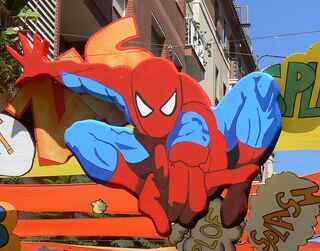Guilt
The Spider, the Bat, and Heroic Varieties of Survivor Guilt
Survivor guilt can motivate in emotionally-driven ways that defy causal logic.
Posted September 7, 2022 Reviewed by Gary Drevitch

Guilt and grief, potentially powerful emotions, can drive a range of human behavior from depressive withdrawal to desperate distraction to adaptive growth. Though the superheroes Batman and Spider-Man are fictitious, their origins reflect some of the most basic human concerns: fear of losing one's parents, guilt over past decisions, and desperate wishes to do things in a better way. Both characters suffer survivor guilt, feeling wrong for surviving when others did not, an emotional response that may defy logic over whether the survivor did or did not do anything they ought to feel guilty about (Hutson et al, 2015; Kip et al, 2022; Porter, 1981).
Young Bruce Wayne sees a mugger gun down his parents after a movie one night. This motivates him to wage a war against crime in a way that makes sense to a young boy, and so he grows up to turn himself into something larger than life: Batman (Detective Comics #33, 1939). Teenager Peter Parker, on the other hand, gains his spider powers and turns himself into a wrestler called Spider-Man before he suffers his tragic loss, the murder of fatherly Uncle Ben (Amazing Fantasy #15, 1962). Whereas the boy Bruce grows up fantasizing about becoming the kind of person who could have prevented that, so that he might one day keep others from enduring what his family suffered, Peter dwells in counterfactual thinking, ruminating that life would be better "if only" he had done things a different way—in his case, if only he had previously stopped the burglar who would go on to kill Uncle Ben.
While both feel guilty for surviving and both mentally relive their defining traumas often, their guilt is not the same. A physically-normal eight-year-old boy lacks the ability to overpower a man with a gun and bears no responsibility for his parents being in the wrong place at the wrong time. A teenager who already has great power, though, may be able to stop a man with a gun, and Peter Parker blames himself for allowing that robber to get away and then cross paths with his uncle. Batman plans ahead and pushes himself to help others. Spider-Man repeatedly reminds himself of that robber who got away when he's tempted to let others handle crises by themselves. Whereas Batman tries to prepare for every contingency, Spider-Man barely plans ahead. When the Black Cat asks Spidey if he is ready to face a mighty opponent (The Amazing Spider-Man #89, 2022), he tells her, "That's my secret, Cat. I'm never ready."
Counterfactual ruminations can worsen or possibly cause feelings of depression and guilt while future-oriented plans to take action can bolster a victim or survivor, empowering the person and reducing feelings of helplessness (Broomhall et al, 2017; Mandel & Dhami, 2005; McCullough, 2008). This becomes a vicious cycle as depression can amplify counterfactual thinking (Feng et al., 2015). To be sure, counterfactual thinking can be comforting and even inspirational when it motivates the forward-looking person to do better and make the world better (Markman et al., 2009), as long as the person focuses on how to achieve good in the future instead of wishing impossibly that they could change. It's a tricky balance that may depend on degree, focus, and feeling less motivated by self-criticism than by a broader sense of inspiration.
People who undergo the transformative process of posttraumatic growth, growing as a person and finding purpose in life after a traumatic event, nevertheless have some things in common with people suffering posttraumatic stress disorder (PTSD), especially the symptom of persistent intrusions. They relive their traumas and losses more than average, but making meaning out of trauma predicts better adjustment (Park, 2010). By feeling negative emotions and recalling unpleasant events, a person can learn from them. Intrusive, unwanted ruminations that run roughshod over other thoughts can evolve into intentional contemplation. Such deliberation can sometimes help a victim or co-victim face the pain without drowning in it (Dekel et al., 2012; Helgeson et al, 2006; Harvey et al, 1998). A shakeup of one's worldview can mark the starting point for eventual achievement (Calhoun et al, 2010, mentioned in Langley, 2022).
Candice Lightner founded Mothers Against Drunk Drivers after the light sentence handed down to her daughter's killer left her appalled. John Walsh began advocating for missing children and hosted America's Most Wanted after the murder of his 6-year-old son. They did not disappear into a dark room, there to sink into isolated depression. They took their pain and, in a way, shared it with the world to take positive action in other people's lives. Their experiences matter and people do need to know about them. The weight of real tragedy can make it difficult for many to spend much time thinking about it, though, as emotional responses get in the way of ongoing thought.

Sometimes we need fictional survivors, even fantastical ones such as Batman and Spider-Man, to help us mentally rehearse for when we might need to help others. Heroic imagination prepares us to take heroic action (Kohen et al, 2019; Zimbardo, 2018). Some direct their pain into positive pursuits, maybe even finding a constructive outcome from "what if" kinds of thought. Not every hero needs to suffer, but those who have suffered may help prepare those who have not.
References
Hutson, S. P., Hall, J. M., & Pack, F. L. (2015). Survivor guilt analyzing the concept and its contexts. Advances in Nursing Science, 38(1), 20–33.
Kip, A., Diele, J., Holling, H., & Morina, N. (2022). The relationship of trauma-related guilt with ptsd symptoms in adult trauma survivors: A meta-analysis. Psychological Medicine. Advance online publication. https://doi.org/10.1017/S0033291722001866
McCullough, M. E. (2008). Beyond revenge: The evolution of the forgiveness instinct. Jossey-Bass.
Porter, J. N. (1981). Is there a survivor's syndrome? Psychological and socio-political implications. Journal of Psychology & Judaism, 6(1), 33-52.
Broomhall, A. G., Phillips, W. J., Hine, D. W., & Loi, N. M. (2017). Upward counterfactual thinking and depression: A meta-analysis. Clinical Psychology Review, 55, 56–73.
Calhoun, L. G., Cann, A., Tedeschi, R. G. (2010). The posttraumatic growth model: Sociocultural considerations. In T. Weiss & R. Berger (Eds.), Handbook of posttraumatic growth: Research and practice (pp. 1-23). Erlbaum.
Dekel, S., Ein-Dor, T., & Solomon, Z., (2012). Posttraumatic growth and posttraumatic stress. Psychological Trauma: Theory, Research, Practice, & Policy, 4(1), 94-101.
Feng, X., Gu, R., Liang, F., Broster, L. S., Liu, Y., Zhang, D., & Luo, Y.-j. (2015). Depressive states amplify both upward and downward counterfactual thinking. International Journal of Psychophysiology, 97(2), 93–98.
Harvey, A. G., Bryant, R. A., & Dang, S. T. (1998). Autobiographical memory in acute stress disorder. Journal of Consulting & Clinical Psychology, 66(3), 500-506.
Helgeson, V. S., Reynolds, K. A., & Tomich, P. L. (2006). A meta-analytic review of benefit finding and growth. Journal of Consulting & Clinical Psychology, 74(5), 797-816.
Kohen, A., Langdon, M., & Riches, B. R. (2019). The making of a hero: Cultivating empathy, altruism, and heroic imagination. Journal of Humanistic Psychology, 59(4), 617–633.
Langley, T. (2022). Batman and psychology: A dark and stormy knight. Wiley.
Mandel, D. R., & Dhami, M. K. (2005). "What I did" versus "what I might have done": Effect of factual versus counterfactual thinking on blame, guilt, and shame in prisoners. Journal of Experimental Social Psychology, 41(6), 627–635.
Mandel, D. R., & Dhami, M. K. (2005). "What I did" versus "what I might have done": Effect of factual versus counterfactual thinking on blame, guilt, and shame in prisoners. Journal of Experimental Social Psychology, 41(6), 627–635.
Markman, K. D., Karadogan, F., Lindberg, M. J., & Zell, E. (2009). Counterfactual thinking: Function and dysfunction. In K. D. Markman, W. M. P. Klein, & J. A. Suhr (Eds.), Handbook of imagination and mental simulation (pp. 175–193). Psychology Press.
Park, C. L. (2010). Making sense of the meaning literature: An integrative review of meaning making and its effects on adjustment to stressful life events. Psychological Bulletin, 136(2), 257-301.
Zimbardo, P. (2018). Exploring human nature and inspiring heroic social action. In A. A. Ariyanto, H. Muluk, P. Newcombe, F. P. Piercy, E. K. Poerwandari, & S. H. R. Suradijono (Eds.), Diversity in unity: Perspectives from psychology and behavioral sciences (pp. 3–9). Routledge/Taylor & Francis Group.


